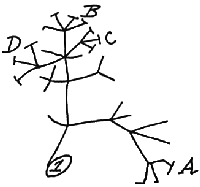Animal Behavior
Prerequisites: BIO 111 & BIO 112
Subject: BIO-225
Study area: Population/Community
Quarter: Fall
Time: Three class hours and laboratory
Years Taught: 2014, 2015, 2016, 2017, 2018

Course Description: This course introduces students to the diversity, mechanisms, and evolutionary bases of animal behavior. In addition, we discuss how ecological factors including competition, resource distribution, predation, and the physical environment all affect how animals balance their investment in growth, survival, and reproduction. This course uses evolutionary theory as an explicit and rigorous framework for studying behavior in its natural contexts. Thus, the behavior expressed by an individual in a particular situation is considered to influence the relative success of that individual in contributing offspring to subsequent generations (the ‘fitness’ of that individual). Natural selection, by favoring those individuals whose behavior causes them to maximize their fitness, can lead to evolutionary changes in behavior. Consequently, this course explores why animals behave the way they do by integrating ideas from evolution, ecology, physiology. Areas of emphasis include the genetics of behavior, predator avoidance, sexual selection, parental care, cooperative and eusocial behavior, as well as animal communication.
